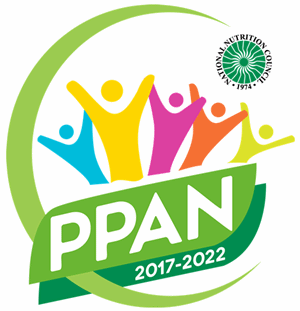|

Assistant
Secretary of Health and NNC Executive Director Maria-Bernardita
Flores (left) presented to Health Secretary Paulyn Rosell-Ubial
the PPAN 2017-2022 Executive Summary during its launching on May
2, 2017 in Iloilo City. |
PPAN launched to
curb malnutrition in next 6 years
Press Release
May 5, 2017
TAGUIG CITY – All is
set for the Philippine Plan of Action for Nutrition (PPAN) 2017-2022
in addressing malnutrition in the country for the next six years as it
was officially launched on 2 May 2017 in Iloilo City. Health Secretary
Paulyn Ubial led the national launch together with other members of
the Governing Board of the National Nutrition Council.
Anchored on the Philippine
Development Plan, the PPAN is the country’s contribution to the
attainment of Sustainable Development Goals (SDGs) of the United
Nations, particularly SDG 2 which is to end hunger, achieve food
security and improved nutrition and promote sustainable agriculture.
Moreover, PPAN 2017-2022 also aims to support the World Health
Assembly Global Target to improve maternal, infant and young child
nutrition by 2025.
The new PPAN is a
results-based plan designed to achieve significant reductions in
different forms of malnutrition such as wasting, stunting,
micronutrient deficiencies and overweight and obesity in the
Philippines. It was constructed based on a landscape situational
analysis of nutrition in the Philippines which shows that the
prevalence of malnutrition in various forms remain high.
Based on the National
Nutrition Survey conducted by the Food and Nutrition Research
Institute (FNRI) in 2015, 33.4% or 3.8 million children are stunted
while 7.1% or 807,057 are wasted. It also showed that overnutrition
manifesting as overweight and obesity are emerging health concerns
among children and a major problems among adults with 18 million
Filipinos who are overweight and obese.
Micronutrient deficiency
which adversely affects a child’s survival also remains a public
health concern. Among pregnant women, 24.8% are nutritionally at risk
with iodine deficiency disorder affecting brain development of unborn
and very young children. The cost of malnutrition greatly affects the
country’s economy with a total loss of P328 Billion in 2013 due to
impacts of child stunting on education and productivity.
 As key to achieving
improvement in nutritional outcomes, PPAN’S strategic thrusts are the
First 1,000 Days of life, complementation of nutrition-specific and
nutrition-sensitive programs, intensified mobilization of local
government units and reaching Geographically Isolated and
Disadvantaged Areas (GIDAs) and communities of indigenous peoples.
As key to achieving
improvement in nutritional outcomes, PPAN’S strategic thrusts are the
First 1,000 Days of life, complementation of nutrition-specific and
nutrition-sensitive programs, intensified mobilization of local
government units and reaching Geographically Isolated and
Disadvantaged Areas (GIDAs) and communities of indigenous peoples.
The new PPAN features 8
nutrition-specific programs devised to address the immediate causes of
malnutrition such as inadequate food and nutrient intake, poor
caregiving and parenting practices, and the burden of infectious
diseases. This will be complemented by nutrition-sensitive programs
which are already existing developmental programs that can be tweaked
to produce nutritional outcomes. These programs will be enabled by
intensive mobilization of LGUs which will involve capacity-building
and mentoring on nutrition program management.
The PPAN 2017-2022 was
approved by the NNC Governing Board during its 1st meeting on 21
February 2017.